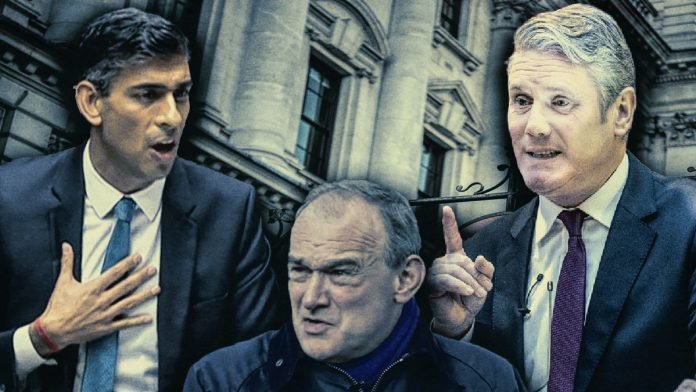By-election results show voters are fed up with the status quo
As the dust settles on the recent by-elections, Rishi Sunak clings to his only remaining hold in Uxbridge, seen by many as a result of Ulez. The race in Boris Johnson’s former constituency was a nail-biter, but Sunak’s party emerged victorious, avoiding a potentially “disastrous” triple by-election defeat.
In the West Country, the Lib Dems celebrated a triumph in Somerton and Frome after the ex-Tory MP’s departure following a drug scandal. The by-election saw the Liberal Democrats overturn a significant Tory majority, leading by 11,008 votes. The swing of 29 points to the Liberal Democrats leaves the Tories with their lowest share of the vote in that seat.
While the Tories dismiss it as a mere warning shot, it was undoubtedly a direct hit that left them sinking in troubled waters.
Labour had its moments of triumph as well, with Sir Keir Starmer seizing Selby and Ainsty, marking the largest ever by-election swing to the Labour Party since 1945, a significant 23.7% swing.
One interesting point about all three results is that there was evidence of tactical voting between Labour and Lib Dem supporters. Labour’s vote share was down over 10% in Somerton and Frome, which helped the Lib Dems. But the Lib Dem vote share dropped by 5% in Uxbridge and South Ruislip and Selby and Ainsty.
Above all, the results demonstrated that voters were casting ballots as a rejection of the Tories rather than an endorsement of Labour. It highlighted the crucial significance of policy when addressing impactful matters on both local and national scales. However, it also raises deep concerns regarding the Labour Party’s trustworthiness on policy matters, as its offerings seem nothing more than a budget version of the Tories.
It becomes apparent that the country’s discontent extends beyond party lines, encompassing the political malaise and corruption within Westminster. Tory MPs warned Sunak that Labour seems to be on course for a general election victory after their double drubbing in Selby and Somerton by-elections.
Nigel Mills, Tory MP for Amber Valley in Derbyshire, told The Independent the Selby result was “clearly not good” and meant “red wall” colleagues across the north and Midlands would worry about losing their own seats. “It reinforces that we’re in a really difficult position. Nobody is in any doubt we have a battle in our hands.
If you lose a 20,000 majority and the opposition poll 20 points ahead of you then you’re going to lose a hell of a lot of seats.” Both results paint a bleak picture for the Conservatives nationally. They show that Sunak has been unable to stop the party shedding seats at by-elections. They again illustrate he is struggling to change to electoral weather.
Rishi Sunak may claim his party’s win in Uxbridge and South Ruislip shows the next general election isn’t a “done deal,” but it also highlights the electorate’s growing dissatisfaction with the status quo.
The results paint a bleak picture for the Conservatives nationally, revealing their struggle to maintain seats at by-elections, even with Sunak at the helm, the stench of a corrupt Tory government still fills the nostrils.
Who needs a resounding Labour victory when you can sit back and watch the Tories stumble? It’s the political equivalent of having your cake and eating it too.
Meanwhile, as the Tories grapple with governance failures, Labour and the Lib Dems stand to capitalise on the spoils, benefiting from a spent opposition.
However, the failure to break through in Uxbridge was something of an embarrassment for Sir Keir Starmer. And while Sir Keir Starmer is undoubtedly basking in the glory, not of Labour’s triumph, but rather of the Tories’ failures, it becomes evident that for the people we are witnessing a Race To The Bottom.
It showed more than anything people were voting against the Tories and not for Labour. It showed that policy really does matter when the public is confronted with life-affecting issues, local or national.
The fact that the Labour Party can’t be trusted on policy, and what policy they do have is a cheap copy of Tory policy is more than concerning.
Meanwhile, David Williams, chair of the Uxbridge and South Ruislip Constituency Labour Party (CLP), has resigned from his role – with a parting blow at Starmer where he rightly condemns Keir Starmer’s leadership as he goes. David Williams: “I have resigned as chair of Uxbridge and South Ruislip CLP. I am also resigning my membership of the Labour Party. Politics needs to have principles or we end up with people like Boris Johnson and Liz Truss running the country, Jeremy Corbyn gave a huge boost to the Labour Party
I have resigned as chair of Uxbridge and South Ruislip CLP. I am also resigning my membership of the Labour Party.
— David Williams (@MrDaveyWilliams) July 21, 2023
Politics needs to have principles or we end up with people like Boris Johnson and Liz Truss running the country,
Jeremy Corbyn gave a huge boost to the Labour Party
As the dust settles, these by-elections have spoken volumes, painting a vivid picture of the electorate’s sentiments and leaving all parties with much to ponder on their paths ahead.
An analysis by Professor John Curtis
An analysis by Professor John Curtis reveals that both Labour and the Tories have questions to answer, as the contrasting election results present broader lessons. The local issue of London mayor Sadiq Khan’s proposed extension of the Ulez low emission zone played a crucial role in shoring up the Conservative vote in Uxbridge and South Ruislip, according to both parties. However, Tory MPs cannot ignore the heavy scale of losses in Somerton and Selby, indicating deep electoral trouble for their party.
In previous by-elections, dissatisfied voters switched to whichever opposition party had the best chance of defeating the local Conservative candidate. This tactical voting was evident in Uxbridge, Selby, and Somerton, with the Liberal Democrat vote being squeezed in Uxbridge and Selby, and Labour being pushed into fifth place in Somerton. Such patterns, if replicated in a general election, could seriously amplify Conservative losses.
On the other hand, Labour’s inability to secure victory in Uxbridge raises questions about the effectiveness of Sir Keir Starmer’s electoral strategy. Critics argue that the party’s appeal, characterized by few promises and a focus on the center ground, proved too fragile when confronted with a challenging local issue.
Support Independent Journalism Today
Our unwavering dedication is to provide you with unbiased news, diverse perspectives, and insightful opinions. We're on a mission to ensure that those in positions of power are held accountable for their actions, but we can't do it alone. Labour Heartlands is primarily funded by me, Paul Knaggs, and by the generous contributions of readers like you. Your donations keep us going and help us uphold the principles of independent journalism. Join us in our quest for truth, transparency, and accountability – donate today and be a part of our mission!
Like everyone else, we're facing challenges, and we need your help to stay online and continue providing crucial journalism. Every contribution, no matter how small, goes a long way in helping us thrive. By becoming one of our donors, you become a vital part of our mission to uncover the truth and uphold the values of democracy.
While we maintain our independence from political affiliations, we stand united against corruption, injustice, and the erosion of free speech, truth, and democracy. We believe in the power of accurate information in a democracy, and we consider facts non-negotiable.
Your support, no matter the amount, can make a significant impact. Together, we can make a difference and continue our journey toward a more informed and just society.
Thank you for supporting Labour Heartlands












